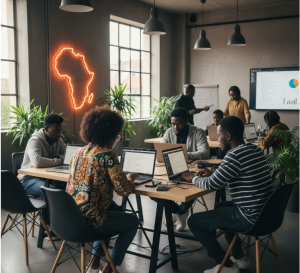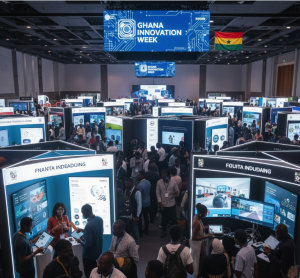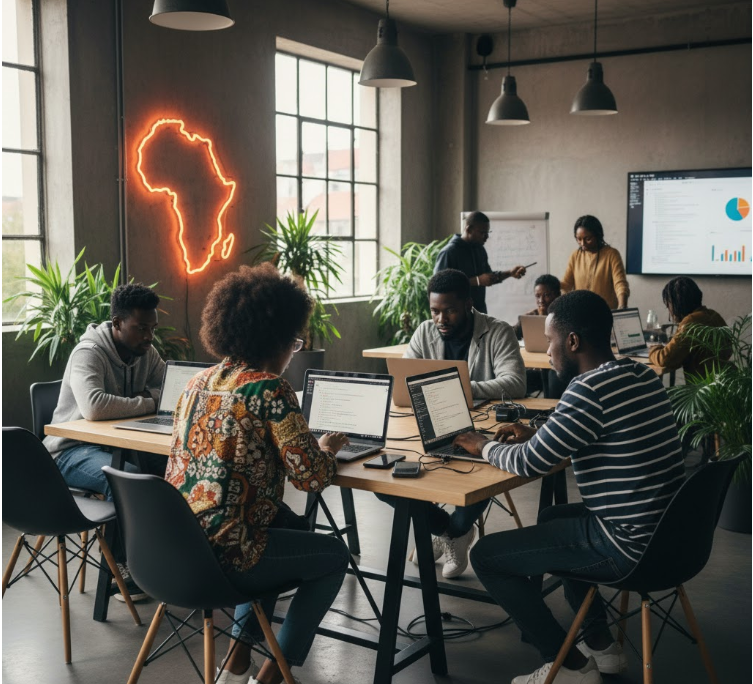Last week, I watched a small business owner in Kaneshie track her entire inventory on her phone using a locally-developed app. Ten years ago, she would have used pen and paper. This transformation captures everything exciting about the latest technology news and trends in Ghana right now: we’re not just consuming technology; we’re creating it, adapting it, and using it to solve uniquely Ghanaian problems.
Here’s what makes Ghana’s tech scene so dynamic in 2025: businesses are rapidly adopting digital tools to improve efficiency, the government is developing an Emerging Technologies Bill to regulate AI and blockchain, the Ghana Digital and Innovation Week is showcasing homegrown innovators across the country, and educational institutions are prioritizing digital literacy and AI integration. From fintech innovations to agritech solutions, Ghana’s technology ecosystem is evolving faster than ever.
Whether you’re a tech entrepreneur, a business owner considering digital transformation, or simply someone curious about where Ghana’s tech industry is heading, staying updated on the latest technology news and trends in Ghana helps you understand the opportunities shaping our digital future.

Government Initiatives: Regulatory Framework and Strategy
Emerging Technologies Bill Coming to Parliament
The Ministry of Communication, Digital Technology and Innovations has announced the development of an Emerging Technologies Bill, which is currently undergoing stakeholder review. The proposed legislation seeks to establish a comprehensive legal and regulatory framework to guide the responsible development and use of Artificial Intelligence (AI), blockchain, and other emerging technologies in Ghana.
Speaking at the Africa Education Trust Fund Artificial Intelligence (AETF.AI) Conference 2025 on November 5, Minister Samuel Nartey George stated that once stakeholder review is completed, followed by necessary consultation, refinement, and Cabinet approval, the Bill will be laid before Parliament, hopefully next year.
This legislative effort represents Ghana’s commitment to creating a structured environment for technological innovation while ensuring ethical standards and protecting national interests. The Bill addresses the reality that emerging technologies like AI and blockchain are already being deployed in Ghana, and proper regulation is essential.
National Artificial Intelligence Strategy
The government has developed a National Artificial Intelligence Strategy to promote the ethical and inclusive use of AI tools across various sectors of the economy. The strategy focuses on building robust digital infrastructure and governance systems, supporting AI research startups and public-private partnerships, and enhancing digital literacy and workforce readiness.
This comprehensive approach ensures Ghana doesn’t just adopt AI reactively but strategically integrates it into economic planning and development initiatives.
Ghana Digital and Innovation Week 2025: Nationwide Showcase
Regional Innovation Takes Center Stage
The Ghana Digital and Innovation Week (GDIW) 2025 has officially commenced, marking a nationwide celebration of creativity, technology, and entrepreneurship. Held on the theme “Catalysing Change: Innovation and Digital Transformation at the Centre of Ghana’s Development Agenda,” the Week is hosted by a consortium comprising Impact Investing Ghana (IIGH), the National Entrepreneurship and Innovation Programme (NEIP), and the Ghana Hubs Network.
Now in its fifth year, GDIW 2025 began with regional editions in Takoradi, Koforidua, Techiman, Wa, and Kumasi, with additional events scheduled for Tamale. These regional activities showcase local innovators and start-ups developing practical solutions to real-world challenges including agritech, climate-smart innovations, digital trade, and youth entrepreneurship.
Grand Finale in Accra
The event will culminate into the Grand Finale in Accra from November 12–14, 2025, where regional winners, ecosystem leaders, and international partners will converge to showcase Ghana’s innovation story to the world.
Mr. Emmanuel Ofori, Director of Innovation at the Ministry of Communications, Digital Technology, and Innovations, emphasized government commitment: “We remain committed to building the digital rails upon which transformation can happen. From broadband expansion and e-government services to the rollout of digital ID systems, the real power of transformation lies in our people and platforms, the start-ups, innovators, and partnerships that give meaning to innovation.”
Business Digital Transformation: From Manual to Digital
Ghanaian Businesses Embrace Digital Solutions
Ghanaian businesses are increasingly adopting digital solutions to improve efficiency and stay competitive in a fast-changing marketplace, according to technology firm Jogobu Limited. Many companies are recognizing that manual systems and scattered communication channels slow down operations, make decision-making difficult and increase the risk of financial losses.
Speaking at a seminar for businesses in Accra, Blaise Kudatugu, CEO of Jogobu Limited, explained that the shift toward technology is being driven by the need for real-time information, faster workflow execution and better control over resources.
Changing Perceptions About Technology Costs
Many businesses are moving away from the belief that technology is expensive. Instead, companies now view digital systems as tools that prevent unnecessary spending and reduce workload. When businesses compare the cost with daily losses from slow manual checks, stock misplacements and repeated purchases, they realize the investment pays for itself.
This mindset shift is crucial. Organizations that once relied heavily on physical counting and handwritten audits now complete the same work digitally in significantly less time, freeing staff to focus on productive tasks.
Improved Accountability Through Digital Systems
The transition to digital systems is also improving accountability within institutions. Real-time tracking of goods and resources reduces opportunities for misplacement and irregularities. With digital systems, managers know what they have, where it is and who has accessed it.
According to Kudatugu, the growing interest signals a broader awareness that technology is central to Ghana’s economic transformation.
Education Sector: Digital Literacy and AI Integration
Commitment to Technology-Driven Education
Ghana has renewed its commitment to promoting digital literacy, integrating Artificial Intelligence (AI), and strengthening foundational learning as part of efforts to transform its education system into a leading hub of academic excellence in Africa. This follows the successful conclusion of the 2025 Association for the Development of Education in Africa (ADEA) Triennale, which ended in Accra last Friday.
The three-day event brought together ministers of education, development partners, researchers, academics, and funding institutions from across the continent to discuss practical solutions to challenges facing Africa’s education sector.
Deputy Minister of Education, Dr. Clement Abas Apaak, said the meeting reaffirmed Africa’s human resource potential and the urgency of accelerating digital transformation in education, and expressed optimism that its outcomes would help build inclusive and technology-driven education systems across Africa.
Upcoming Tech Events and Conferences
Tech in Ghana Conference 2025 in Kumasi
The next edition of Tech in Ghana is scheduled to take place in Kumasi on 4th and 5th December. This year will be the 16th edition of the conference and the first time it will be held in Kumasi. The theme of this year’s event is “Royal Edition: Where Tradition Meets Innovation,” emphasising how traditional industries (manufacturing, agriculture, education) are being transformed via technology.
Moving the conference to Kumasi signals the decentralization of Ghana’s tech ecosystem beyond Accra, recognizing that innovation happens nationwide.
Salesforce West Africa Dreamin’ Event
A Salesforce-focused West Africa Dreamin’ Event is scheduled to kick off in Accra on November 15th, bringing together professionals using Salesforce platforms across the region.
Key Technology Trends Shaping Ghana
Fintech and Mobile Money Dominance
Ghana’s fintech sector continues driving financial inclusion. Mobile money transactions have become integral to daily commerce, with platforms like MTN Mobile Money and Vodafone Cash processing millions of transactions daily. Digital lending and investment platforms are democratizing access to financial services.
E-commerce Growth and Infrastructure Needs
Online retail and digital marketplaces are expanding, though challenges remain. Ghana must strengthen digital infrastructure, logistics networks, and consumer trust systems to sustain the next phase of e-commerce growth.
Agritech Solutions for Food Security
Innovators are developing practical agricultural technology solutions addressing farming challenges, from weather prediction apps to market linkage platforms connecting farmers directly to buyers.
Cloud Services and Data Management
Amazon Web Services (AWS) introduced a 21% tax on cloud services for customers in Ghana starting March 2025, impacting businesses using cloud infrastructure. Despite tax implications, cloud adoption continues as organizations recognize benefits of scalable, flexible computing resources.
AI and Automation
Artificial Intelligence is being integrated across sectors including customer service (chatbots), financial services (credit scoring), healthcare (diagnostics support), and education (personalized learning). The BUILD company, founded by Julian Owusu, focuses specifically on AI and business automation for the future.
Challenges and Opportunities
Infrastructure Gaps
While progress is evident, broadband penetration remains inconsistent, particularly in rural areas. Power supply reliability continues affecting tech operations, though solar and alternative energy solutions are emerging.
Skills Development Needs
The technology sector’s growth outpaces skills development. However, initiatives like the Smart Africa Digital Academy, launched in partnership with Ghana’s Ministry of Communications and Digitalisation, are addressing this through targeted training programs.
Investment and Funding
While local startups attract attention at innovation weeks, accessing growth capital remains challenging. Venture Platform recently secured $64M to power Africa’s next tech wave, signaling increasing investor interest in the region.
Regulatory Balance
The upcoming Emerging Technologies Bill must balance innovation encouragement with consumer protection and ethical standards. Getting this balance right will determine whether Ghana becomes a tech leader or stifles innovation through over-regulation.
What This Means for Different Stakeholders
For Businesses: Digital transformation isn’t optional anymore. Companies adopting digital tools now position themselves competitively for the future.
For Developers and Tech Professionals: Ghana’s growing tech ecosystem creates abundant opportunities. Skills in AI, blockchain, cloud computing, and mobile development are particularly valuable.
For Investors: Ghana’s tech sector offers opportunities, especially in fintech, agritech, and digital services addressing local market needs.
For Students: Prioritizing digital literacy and technical skills opens career pathways in Ghana’s evolving economy.
For Policymakers: Creating enabling environments through smart regulation, infrastructure investment, and skills development will determine Ghana’s digital future.
Looking Ahead: Ghana’s Digital Future
The convergence of government commitment, private sector innovation, and educational focus on digital skills positions Ghana favorably for continued technological advancement. Key indicators to watch include:
- Parliamentary passage and implementation of the Emerging Technologies Bill
- Outcomes from Ghana Digital and Innovation Week showcasing scalable solutions
- Broadband infrastructure expansion and digital penetration rates
- Growth in tech sector employment and startup formation
- Integration of AI and emerging technologies across traditional sectors
What technology trend in Ghana excites you most? How has digital transformation affected your business or daily life? Share your experiences in the comments, and if you found this roundup of the latest technology news and trends in Ghana valuable, share it with entrepreneurs, students, and anyone interested in Ghana’s digital future.
Frequently Asked Questions About Ghana’s Technology Sector
What is the Emerging Technologies Bill and when will it pass?
The Emerging Technologies Bill is proposed legislation developed by Ghana’s Ministry of Communication, Digital Technology and Innovations to establish a comprehensive legal and regulatory framework for Artificial Intelligence (AI), blockchain, and other emerging technologies. Currently undergoing stakeholder review, the Bill is expected to be laid before Parliament in 2026 after consultation, refinement, and Cabinet approval. It aims to guide responsible technology development while ensuring ethical standards and protecting national interests.
What is Ghana Digital and Innovation Week?
Ghana Digital and Innovation Week (GDIW) is an annual nationwide celebration of creativity, technology, and entrepreneurship now in its fifth year. The 2025 edition runs under the theme “Catalysing Change: Innovation and Digital Transformation at the Centre of Ghana’s Development Agenda.” It features regional editions in Takoradi, Koforidua, Techiman, Wa, Kumasi, and Tamale, showcasing local innovators developing solutions in agritech, climate-smart innovations, digital trade, and youth entrepreneurship. The Grand Finale takes place in Accra from November 12-14, 2025.
How are Ghanaian businesses using digital technology?
Ghanaian businesses are increasingly adopting digital solutions to improve efficiency and competitiveness. According to technology firm Jogobu Limited, companies are moving from manual systems to digital tools that provide real-time information, faster workflow execution, and better resource control. Digital systems help with inventory tracking, reduce losses from stock misplacements, improve accountability, and free staff to focus on productive tasks. Many businesses now view digital systems as investments that pay for themselves by preventing daily operational losses.
What technology skills are most in demand in Ghana?
Most in-demand technology skills in Ghana include programming languages (Python, JavaScript, Java), cloud computing (AWS, Azure, Google Cloud), artificial intelligence and machine learning, mobile app development (Android, iOS, React Native, Flutter), cybersecurity, data science and analytics, blockchain technology, and digital marketing. The government’s National AI Strategy emphasizes enhancing digital literacy and workforce readiness, while tech conferences and training programs focus on building these capabilities across the population.
Where can I learn about technology opportunities in Ghana?
To learn about technology opportunities in Ghana, attend events like Ghana Digital and Innovation Week, Tech in Ghana Conference (December 4-5 in Kumasi), and Salesforce West Africa Dreamin’ (November 15 in Accra). Follow tech news platforms like Tech Labari, CIO Africa Ghana, and Ghana News technology sections. Join innovation hubs and tech communities through the Ghana Hubs Network. Engage with government initiatives through the Ministry of Communication, Digital Technology and Innovations, and explore training programs like the Smart Africa Digital Academy.
Sources:
- Ghana News Agency – Official government news covering Ghana Digital Innovation Week and policy announcements
- Business Ghana – Coverage of Emerging Technologies Bill and business technology adoption
- Ghanaian Times – Educational technology initiatives and ADEA Triennale outcomes
